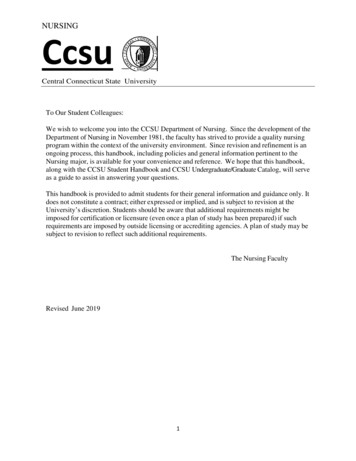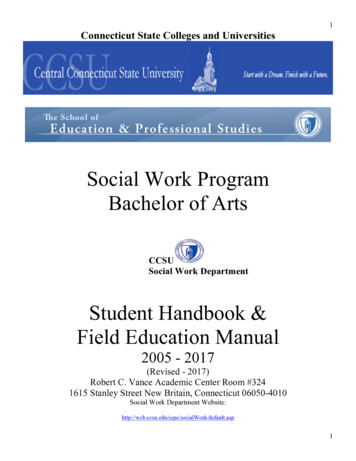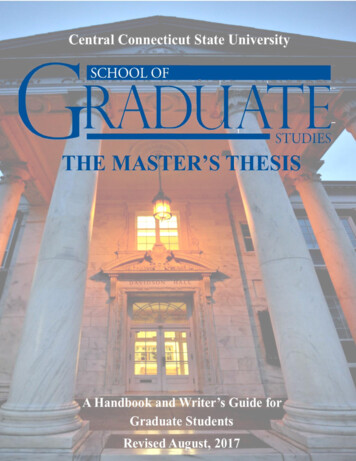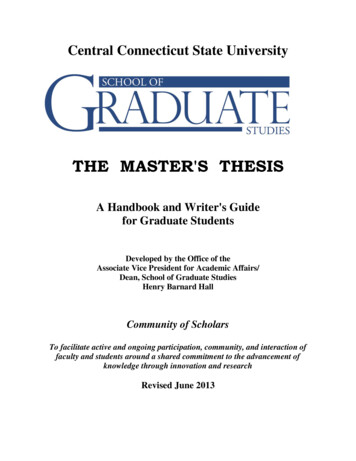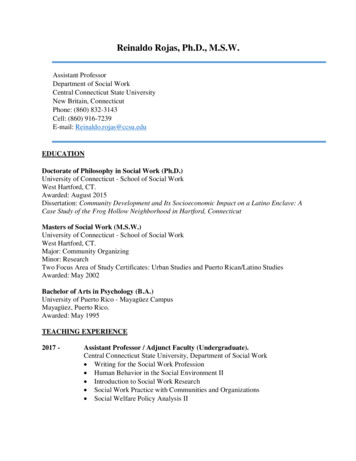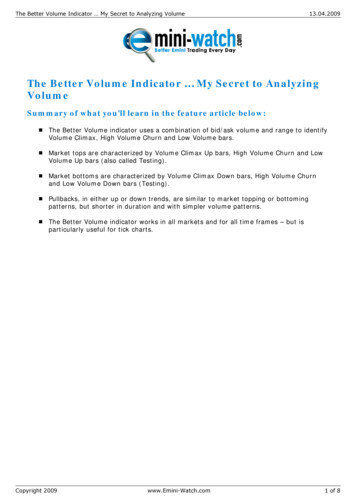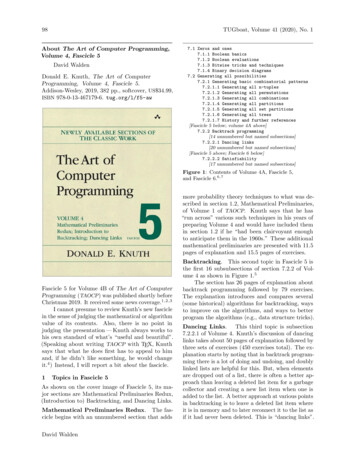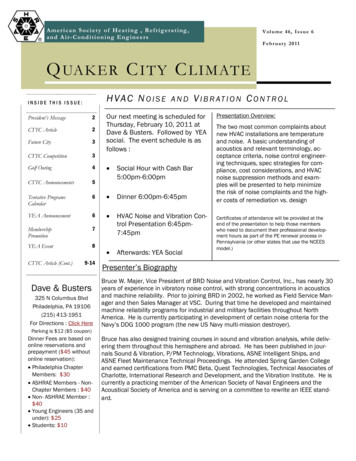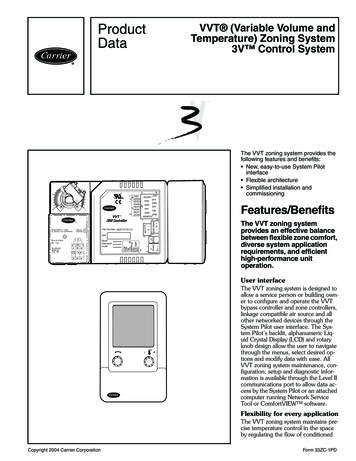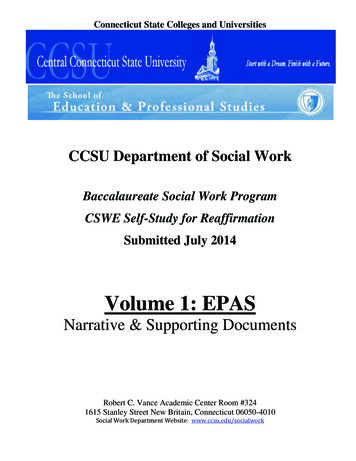
Transcription
Connecticut State Colleges and UniversitiesCCSU Department of Social WorkBaccalaureate Social Work ProgramCSWE Self-Study for ReaffirmationSubmitted July 2014Volume 1: EPASNarrative & Supporting DocumentsRobert C. Vance Academic Center Room #3241615 Stanley Street New Britain, Connecticut 06050-4010Social Work Department Website: www.ccsu.edu/socialwork
Overview Letter
Accreditation Review BriefCouncil on Social Work EducationCommission on Accreditation2008 EPASThe Accreditation Review Brief is a tool used by the Commission on Accreditation (COA) commissionreader to report his or her evaluation of the program. Section 2 of the Accreditation Review Brief listseach accreditation standard (AS), related Educational Policies (EP), and compliance statements. Thecompliance statements are from the Compliance, Concern, and Noncompliance (C/C/NC) Statements[available on the CSWE website px]. It providesstatements of compliance, concern, and noncompliance for each Accreditation Standard (AS) and relatedEducational Policies (EP).Compliance indicates that the program addressed the minimum requirements for completelyand clearly meeting an accreditation standard and related educational policy.Concern indicates that the narrative addressing an accreditation standard or relatededucational policy is unclearly and inadequately addressed.Noncompliance indicates that an accreditation standard or related educational policystatement has not been met and has not been addressed.The program fills out one accreditation review brief for each program level that is being reviewed forReaffirmation. The program completes identifying information in Section 1. In the location column ofSection 2, the program indicates the document name and page number where each compliancestatement for an accreditation standard is addressed in the program s self study. The program thenemails the accreditation review brief to its accreditation specialist per the instructions in the Timetable forReaffirmation [available on the CSWE website px].The accreditation specialist emails the accreditation review brief to the COA Commission reader assignedto review the program s self study for Site Team Instructions.The commission reader types compliance, concern, or noncompliance next to each compliance statementof the accreditation standard in the C/C/NC column to report how the program addressed each item. Forany compliance statement of an accreditation standard marked concern or noncompliance, thecommission reader indicates her or his reasoning in the comments column.Section 1In Section 1, the program fills in the identifying information below.ProgramUniversity:Central Connecticut StateUniversity (CCSU)Program Chief AdministratorName:Delia J. González Sanders, PhD.,MSSW, LCSWAddress:Robert C. Vance AcademicCenter Room #3241615 Stanley StreetTitle:Associate ProfessorChair, Social Work DepartmentProgram DirectorCity, State:New Britain, CT 06050-4010sandersdej@ccsu.eduSubmissionDate:July 30, 2014EmailAddress:Web URL:www.ccsu.edu/socialworkLevel of Program(check one)XXXXXXXBaccalaureate Degree ProgramMaster s Degree ProgramAccreditation Review Brief for 2008 EPAS9.19.2013 ARHPage 1 of 35
Review Brief
Section 2In Section 2, the program uses the Location column to indicate the document name and page number where each compliance item of an accreditationstandard can be found in the self study. The commission reader types compliance, concern, or noncompliance next to each compliance statement of anaccreditation standard in the C/C/NC column to report how the program addressed each item. For any compliance statement of an accreditation standardmarked concern or noncompliance, the commission reader indicates her or his reasoning in the comments column.1. Program Mission and GoalsPurpose: Social Work Practice, Education, and Educational Policy and Accreditation StandardsThe purpose of the social work profession is to promote human and community well-being. Guided by a person and environment construct, a globalperspective, respect for human diversity, and knowledge based on scientific inquiry, social work s purpose is actualized through its quest for social andeconomic justice, the prevention of conditions that limit human rights, the elimination of poverty, and the enhancement of the quality of life for all persons.Educational Policy 1.0 Program Mission and GoalsThe mission and goals of each social work program address the profession s purpose, are grounded in core professional values (EP 1.1), and areinformed by context (EP 1.2).Educational Policy 1.1 ValuesService, social justice, the dignity and worth of the person, the importance of human relationships, integrity, competence, human rights, and scientificinquiry are among the core values of social work. These values underpin the explicit and implicit curriculum and frame the profession s commitment torespect for all people and the quest for social and economic justice.Educational Policy 1.2 Program ContextContext encompasses the mission of the institution in which the program is located and the needs and opportunities associated with the setting.Programs are further influenced by their historical, political, economic, social, cultural, demographic, and global contexts and by the ways they elect toengage these factors. Additional factors include new knowledge, technology, and ideas that may have a bearing on contemporary and future social workeducation and practice.Accreditation Standard 1.0 Program Mission and GoalsThe social work program s mission and goals reflect the profession s purpose and values and the program s context.Accreditation StandardCompliance StatementLocation C/C/NC1.0.1: [The program] submits its missionProgram s mission statement V1 / Ch 1statement and describes how it is consistentPage 6was submitted.with the profession s purpose and values andHBFMprogram context.Sec. 1V1 / ChNarrative demonstrated how1- Pagesthe program s mission is6&7consistent with theprofession s purpose &V1 / Ch 1values and program s/ Tab Ccontext.Table 1 AAccreditation Review Brief for 2008 EPASComments9.19.2013 ARHPage 2 of 35
Section 21.0.2: [The program] identifies its goals anddemonstrates how they are derived from theprogram s mission.Program goals wereidentified.V1 / Ch 1/ Page 7V1 / Ch 1/ Tab CTable 1 AHBFMSec. 1 &Sec IINarrative demonstrated howprogram goals are derivedfrom its mission statement.V1 / Ch 1- Pages 6 & 7V1 / Ch 1 / Tab C- Table 1 AAccreditation Review Brief for 2008 EPAS9.19.2013 ARHPage 3 of 35
2. Explicit CurriculumEducational Policy B2.2 Generalist PracticeGeneralist practice is grounded in the liberal arts and the person and environment construct. To promote human and social well-being, generalistpractitioners use a range of prevention and intervention methods in their practice with individuals, families, groups, organizations, and communities. Thegeneralist practitioner identifies with the social work profession and applies ethical principles and critical thinking in practice. Generalist practitionersincorporate diversity in their practice and advocate for human rights and social and economic justice. They recognize, support, and build on thestrengths and resiliency of all human beings. They engage in research-informed practice and are proactive in responding to the impact of context onprofessional practice. BSW practice incorporates all of the core competencies.Accreditation Standard B2.0 CurriculumThe 10 core competencies are used to design the professional curriculum.Accreditation StandardCompliance StatementB2.0.1: [The program] discusses how itsNarrative discussed how themission and goals are consistent withprogram s mission & goalsgeneralist practice as defined in EP B2.2.are consistent with corecompetencies that definegeneralist practice.LocationV1 / ch 2page 14;C/C/NCCommentsV 1 / ch2/ tab B /Table 2AHBFMSection I,II & IIIAccreditation Review Brief for 2008 EPAS9.19.2013 ARHPage 4 of 35
2. Explicit CurriculumEducational Policy 2.1 Core CompetenciesCompetency-based education is an outcome performance approach to curriculum design. Competencies are measurable practice behaviors that arecomprised of knowledge, values, and skills. The goal of the outcome approach is to demonstrate the integration and application of the competencies inpractice with individuals, families, groups, organizations, and communities. The ten core competencies are listed below [EP 2.1.1 EP 2.1.10(d)],followed by a description of characteristic knowledge, values, skills, and the resulting practice behaviors that may be used to operationalize thecurriculum and assessment methods. Programs may add competencies consistent with their missions and goals.EP 2.1.1 Identify as a professional social worker and conduct oneself accordingly.EP 2.1.2 Apply social work ethical principles to guide professional practice.EP 2.1.3 Apply critical thinking to inform and communicate professional judgments.EP 2.1.4 Engage diversity and difference in practice.EP 2.1.5 Advance human rights and social and economic justice.EP 2.1.6 Engage in research-informed practice and practice-informed research.EP 2.1.7 Apply knowledge of human behavior and the social environment.EP 2.1.8 Engage in policy practice to advance social and economic well-being and to deliver effective social work services.EP 2.1.9 Respond to contexts that shape practice.EP 2.1.10(a) (d) Engage, assess, intervene, and evaluate with individuals, families, groups, organizations, and communities.Accreditation StandardB2.0.2: [The program] identifies itscompetencies consistent with EP 2.1 through2.1.10(d).Compliance StatementProgram competencies wereidentified.LocationV1 / ch 1/ pages5-6C/C/NCCommentsHBFMSec I &IIINarrative showed consistencyof the program s competencieswith EP 2.1.1 through 2.1.10(d).B2.0.3: [The program] provides anoperational definition for each of itscompetencies used in its curriculum designand its assessment [EP 2.1 through2.1.10(d)].Accreditation Review Brief for 2008 EPASMeasurable practice behaviorsthat operationalize eachcompetency were provided.V 1 / Ch2pages 56 andsupported in all ch2 pagesV1 / ch 1/ pages5-6HBFMSec IV,V, VI9.19.2013 ARHPage 5 of 35
2. Explicit CurriculumAccreditation Review Brief for 2008 EPAS9.19.2013 ARHPage 6 of 35
2. Explicit CurriculumEducational Policy 2.0 The Social Work Curriculum and Professional PracticeThe explicit curriculum constitutes the program s formal educational structure and includes the courses and the curriculum. Social work education isgrounded in the liberal arts, which provide the intellectual basis for the professional curriculum and inform its design. The explicit curriculum achievesthe program s competencies through an intentional design that includes the foundation offered at the baccalaureate and master s levels and theadvanced curriculum offered at the master s level. The BSW curriculum prepares its graduates for generalist practice through mastery of the corecompetencies. The MSW curriculum prepares its graduates for advanced practice through mastery of the core competencies augmented by knowledgeand practice behaviors specific to a concentration.Accreditation StandardB2.0.4: [The program] provides a rationale forits formal curriculum design demonstratinghow it is used to develop a coherent andintegrated curriculum for both classroom andfield (EP 2.0).Accreditation StandardB2.0.5: [The program] describes and explainshow its curriculum content (knowledge,values, and skills) implements the operationaldefinition of each of its competencies.Compliance StatementNarrative provided a rationalefor curriculum design.LocationV 1 / ch 2 /pages 711C/C/NCCommentsC/C/NCCommentsHBFMSec IIINarrative demonstrated howthe rationale for curriculumdesign is used to develop acoherent and integrated classand field curriculum.V 1 / ch 2 /pages 711Compliance StatementNarrative described andexplained how the curriculumprovides the necessaryknowledge, values and skillsto operationalize eachcompetency.LocationV 1 / ch 2 /pages 911V 1/ ch 2 /Tab CTable 2DV 1/ ch 2 /Tab CTable 2DHBFM IV,V, VIAccreditation Review Brief for 2008 EPAS9.19.2013 ARHPage 7 of 35
2. Explicit CurriculumEducational Policy M2.2 Advanced PracticeAdvanced practitioners refine and advance the quality of social work practice and that of the larger social work profession. They synthesize and apply abroad range of interdisciplinary and multidisciplinary knowledge and skills. In areas of specialization, advanced practitioners assess, intervene, andevaluate to promote human and social well-being. To do so they suit each action to the circumstances at hand, using the discrimination learned throughexperience and self-improvement. Advanced practice incorporates all of the core competencies augmented by knowledge and practice behaviorsspecific to a concentration.Accreditation Standard M2.0 CurriculumThe 10 core competencies are used to design the foundation and advanced curriculum. The advanced curriculum builds on and applies the corecompetencies in an area(s) of concentration.Accreditation StandardCompliance StatementLocation C/C/NCCommentsM2.0.1: [The program] identifies itsconcentration(s) (EP M2.2).M2.0.2: [The program] discusses how itsmission and goals are consistent withadvanced practice (EP M2.2).Accreditation Review Brief for 2008 EPASEach concentration wasidentified.Narrative discussed how theprogram s mission and goalsare consistent with advancedpractice, which incorporatesall of the core competenciesaugmented by knowledge andpractice behaviors specific tothe concentration.9.19.2013 ARHPage 8 of 35
2. Explicit CurriculumEducational Policy 2.1 Core CompetenciesCompetency-based education is an outcome performance approach to curriculum design. Competencies are measurable practice behaviors that arecomprised of knowledge, values, and skills. The goal of the outcome approach is to demonstrate the integration and application of the competencies inpractice with individuals, families, groups, organizations, and communities. The ten core competencies are listed below [EP 2.1.1 EP 2.1.10(d)],followed by a description of characteristic knowledge, values, skills, and the resulting practice behaviors that may be used to operationalize thecurriculum and assessment methods. Programs may add competencies consistent with their missions and goals.EP 2.1.1 Identify as a professional social worker and conduct oneself accordingly.EP 2.1.2 Apply social work ethical principles to guide professional practice.EP 2.1.3 Apply critical thinking to inform and communicate professional judgments.EP 2.1.4 Engage diversity and difference in practice.EP 2.1.5 Advance human rights and social and economic justice.EP 2.1.6 Engage in research-informed practice and practice-informed research.EP 2.1.7 Apply knowledge of human behavior and the social environment.EP 2.1.8 Engage in policy practice to advance social and economic well-being and to deliver effective social work services.EP 2.1.9 Respond to contexts that shape practice.EP 2.1.10(a) (d) Engage, assess, intervene, and evaluate with individuals, families, groups, organizations, and communities.Educational Policy M2.2 Advanced PracticeAdvanced practitioners refine and advance the quality of social work practice and that of the larger social work profession. They synthesize and apply abroad range of interdisciplinary and multidisciplinary knowledge and skills. In areas of specialization, advanced practitioners assess, intervene, andevaluate to promote human and social well-being. To do so they suit each action to the circumstances at hand, using the discrimination learned throughexperience and self-improvement. Advanced practice incorporates all of the core competencies augmented by knowledge and practice behaviorsspecific to a concentration.Accreditation StandardM2.0.3: [The program] identifies its programcompetencies consistent with EP 2.1 through2.1.10(d) and EP M2.2.M2.0.4: [The program] provides anoperational definition for each of thecompetencies used in its curriculum designand its assessment [EP 2.1 through 2.1.10(d);EP M2.2].Accreditation Review Brief for 2008 EPASCompliance StatementProgram competencies wereidentified.LocationC/C/NCCommentsNarrative showed consistencyof the program scompetencies with EP 2.1.12.1.10d.Measurable practicebehaviors that operationalizeeach competency wereprovided.9.19.2013 ARHPage 9 of 35
2. Explicit CurriculumEducational Policy 2.0 The Social Work Curriculum and Professional PracticeThe explicit curriculum constitutes the program s formal educational structure and includes the courses and the curriculum. Social work education isgrounded in the liberal arts, which provide the intellectual basis for the professional curriculum and inform its design. The explicit curriculum achieves theprogram s competencies through an intentional design that includes the foundation offered at the baccalaureate and master s levels and the advancedcurriculum offered at the master s level. The BSW curriculum prepares its graduates for generalist practice through mastery of the core competencies. TheMSW curriculum prepares its graduates for advanced practice through mastery of the core competencies augmented by knowledge and practice behaviorsspecific to a concentration.Accreditation StandardM2.0.5: [The program] provides a rationalefor its formal curriculum design (foundationand advanced), demonstrating how it is usedto develop a coherent and integratedcurriculum for both classroom and field (EP2.0).Compliance StatementNarrative provided a rationalefor curriculum design(foundation and advanced).Accreditation StandardM2.0.6: [The program] describes andexplains how its curriculum content (relevanttheories and conceptual frameworks, values,and skills) implements the operationaldefinition of each of its competencies.Compliance StatementNarrative described andexplained how the curriculumprovides the necessaryrelevant theories andconceptual frameworks,values, and skills tooperationalize eachcompetency.Accreditation Review Brief for 2008 rrative demonstrated howthe rationale for curriculumdesign is used to develop acoherent and integrated classand field curriculum.9.19.2013 ARHPage 10 of 35
2. Explicit CurriculumEducational Policy 2.3 Signature Pedagogy: Field EducationSignature pedagogy represents the central form of instruction and learning in which a profession socializes its students to perform the role ofpractitioner. Professionals have pedagogical norms with which they connect and integrate theory and practice. In social work, the signature pedagogy isfield education. The intent of field education is to connect the theoretical and conceptual contribution of the classroom with the practical world of thepractice setting. It is a basic precept of social work education that the two interrelated components of curriculum classroom and field are of equalimportance within the curriculum, and each contributes to the development of the requisite competencies of professional practice. Field education issystematically designed, supervised, coordinated, and evaluated based on criteria by which students demonstrate the achievement of programcompetencies.Accreditation Standard 2.1 Field EducationAccreditation StandardCompliance Statement2.1.1: [The program discusses how its fieldNarrative demonstrated thateducation program] connects the theoreticalthe connection betweenand conceptual contribution of the classroomtheoretical and conceptualwith the practice setting, fostering thecontributions of classroomimplementation of evidence-informedand practice setting fosterspractice.the implementation ofgeneralist or advancedpractice.LocationV 1 / ch 2/ pages12-14C/C/NCCommentsV3 /AppendixA8V 1 / Ch 2/ Tab c /Table 2DHBFMSec IV, V,VIB2.1.2: [The program di
CCSU Department of Social Work Baccalaureate Social Work Program CSWE Self-Study for Reaffirmation Submitted July 2014 Volume 1: EPAS Narrative & Supporting Documents Robert C. Vance Academic Center Room #324 1615 Stanley Street New Britain, Connecticut 06050-4010
